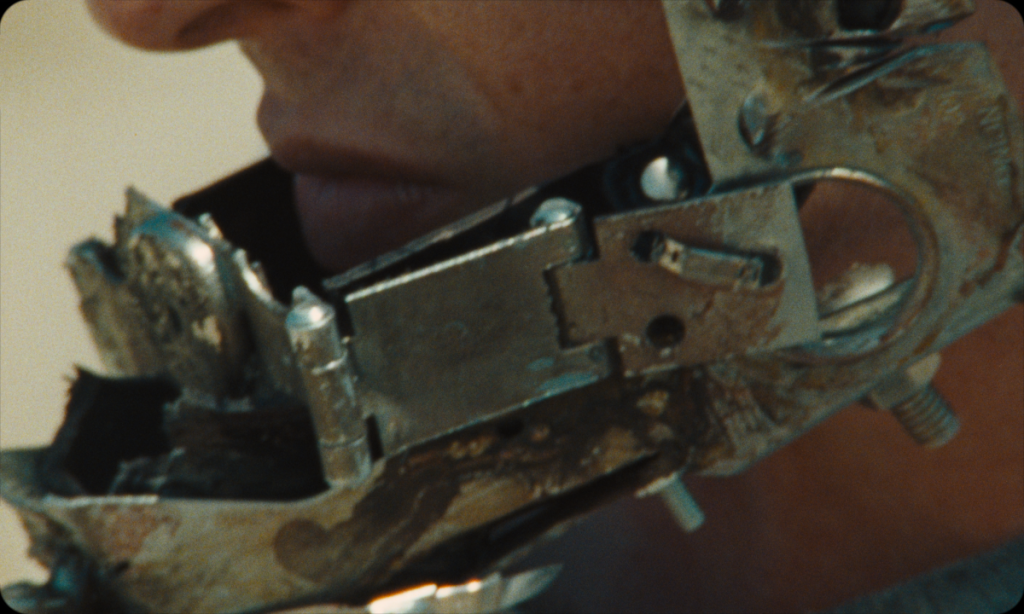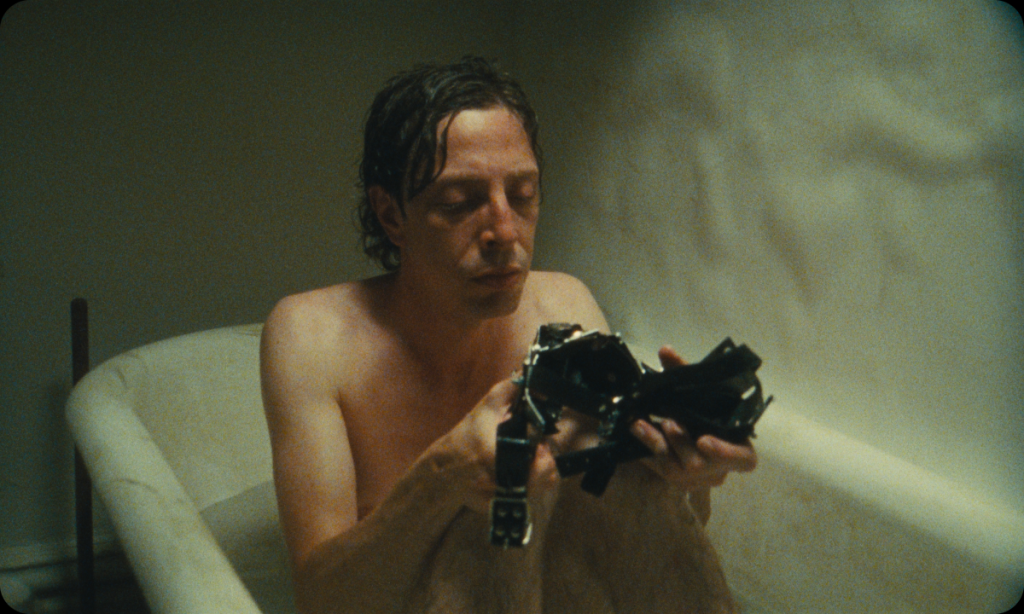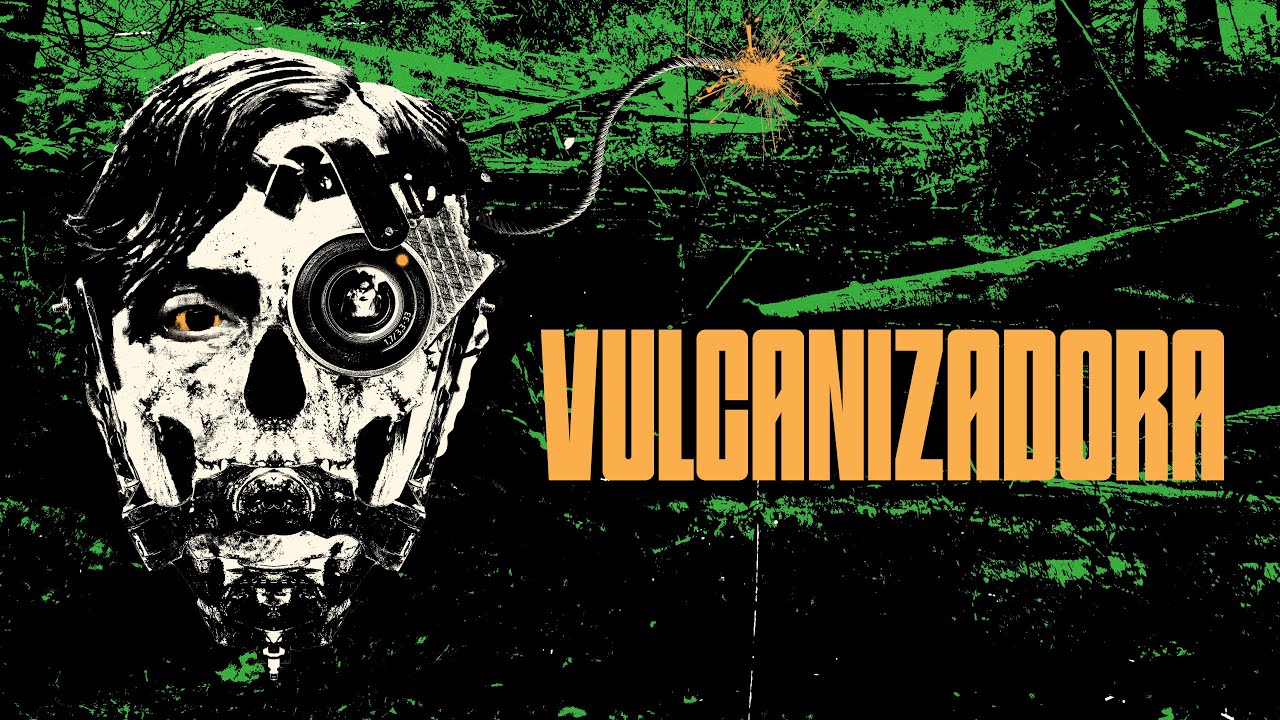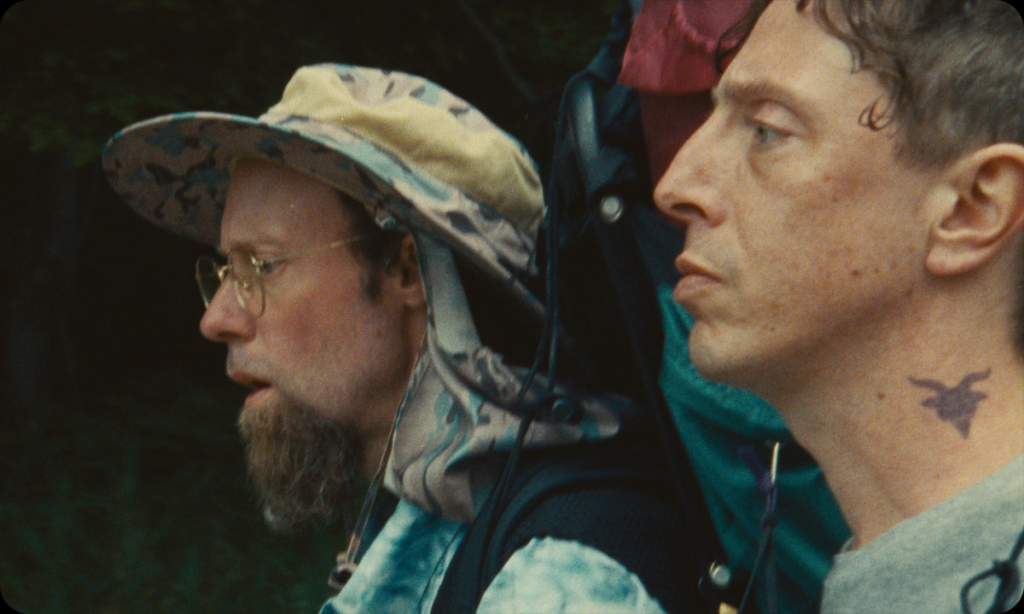Two men wander deep into the Michigan woods, swapping stories, teasing each other, killing time. It all feels casual—almost aimless. But beneath their banter lies something tense, something waiting. Vulcanizadora doesn’t announce its intentions right away; it creeps up slowly, letting the silence between words and the weight of the past do the talking. What begins as a strange, lopsided reunion gradually unravels into something far more intimate and unsettling—a confrontation with failure, regret, and the ghosts that trail behind us when we try to disappear.
The story centers on Marty (Joshua Burge) and Derek (Joel Potrykus), two familiar faces for those who’ve seen Joel Potrykus’s Buzzard, but prior viewing isn’t required to feel the emotional weight of this film. All you need is patience—and maybe a willingness to sit in discomfort. Vulcanizadora begins with loose, almost meaningless conversation: Derek rambles endlessly, stuck in a loop of self-importance and empty knowledge, while Marty simmers with quiet resentment, barely responding. At first, it feels like nothing is happening. But everything is happening. These are men teetering on the edge, not of a cliff exactly, but of their own crumbling sense of purpose.
The dynamic between them is painful to watch. Derek, older and more talkative, tries to hold onto the illusion of control, but he’s clearly fraying. Marty, younger and more stoic, carries his demons like a second skin. They’re both broken in ways they can’t articulate—Derek through a paternal grief that curdles into bitterness, Marty through a restless self-destruction that borders on nihilism. Their friendship is both lifeline and burden, full of tension, codependency, and unspoken grievances. It’s like they’re trying to outrun something, and the woods aren’t deep enough to hide them.

What’s so striking about Vulcanizadora is how it transforms before your eyes. It starts off almost playful—Derek cracking jokes, waving glow sticks around like a child, the pair playing with small explosives as if this is all just a boyish adventure. But the tone shifts slowly, almost imperceptibly, until suddenly you realize you’re no longer watching a buddy film. You’re watching a reckoning. The mood sours, the silence stretches longer, and the emotional weight begins to smother. There’s something tragic about watching two men who can’t quite grow up, stuck in the space between youth and adulthood, performing masculinity while quietly drowning under its expectations.
Marty, in particular, feels like a man unmoored. Accused of arson, still running from the consequences of his past, he wears his guilt like armor. Joshua Burge’s performance is haunting in its restraint—he doesn’t need to say much for us to understand how deeply damaged he is. You can see it in the way he avoids eye contact, the way he recoils from emotion, the way he barely tolerates Derek’s constant chatter. It’s as if Marty is punishing himself by staying close to someone who represents everything he hates in himself. Their final destination—no spoilers here—feels less like a twist and more like a slow, inevitable collapse.
There’s a raw intimacy in how the film is shot, on 16mm, grainy and textured like a memory you’d rather forget. The Michigan woods, beautiful and desolate, are a perfect backdrop for this emotional wilderness. The isolation seeps into every frame, reinforcing the feeling that these men have wandered too far from the world—and maybe from redemption.
The most heartbreaking aspect of the film isn’t found in its explosive plot twists or slow-burning tension, but in the quieter truths that surface beneath the surface. This isn’t a story about camping, or even crime—it’s a portrait of men who were never taught to process pain without inflicting more. It explores the damage caused by silence, by performing toughness instead of seeking support, and the steep cost of refusing to change, even when redemption is within reach.

Joel Potrykus delivers a raw and intimate work—chaotic, furious, yet unexpectedly tender. It refuses to sanitize its characters or hand out simple redemption. Instead, it meets their darkness head-on, with an unflinching empathy and a quiet, surprising grace.
Vulcanizadora is not a film for everyone. It’s slow, it’s emotionally taxing, and it often lingers in discomfort. But for those willing to engage with it, it offers something rare: a brutally honest portrayal of modern masculinity, friendship, and the unbearable weight of regret. It may not make you feel good—but it will make you feel something. And that, in itself, is worth the journey.
Vulcanizadora will debut in select theaters on May 2, 2025, courtesy of Oscilloscope Laboratories.

-
GVN Rating 9
-
User Ratings (2 Votes)
0.9
Codie Allen is a passionate trans and queer film critic and entertainment writer based in Orlando, FL. A Rotten Tomatoes-approved critic, Dorian Awards member, and CACF member, they also contribute to The Curb and InSession Film. When they’re not writing about films, you can find them sipping way too much tea and listening to Taylor Swift.






